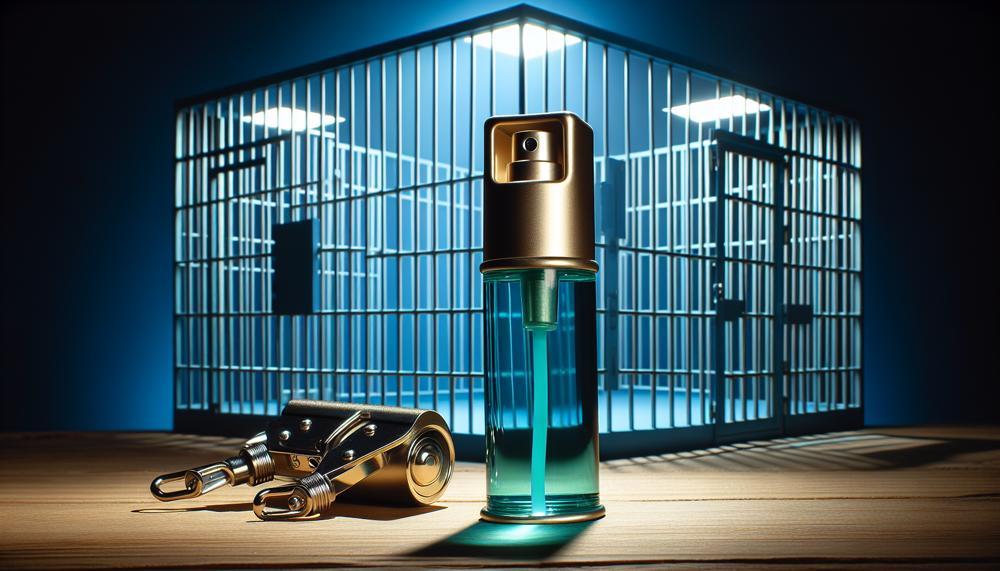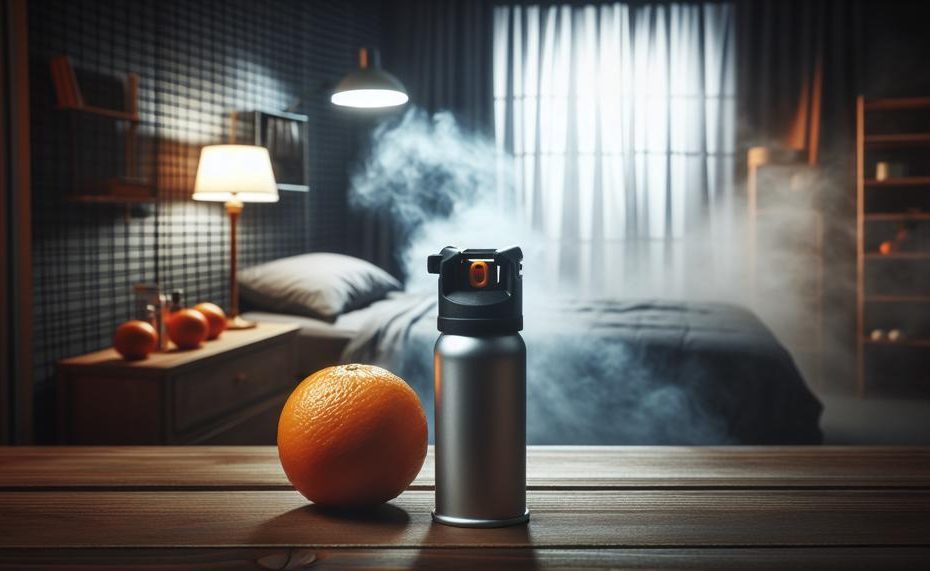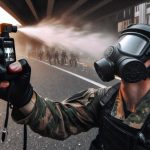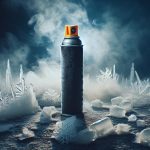Imagine this: you’re strolling down a dimly lit alley, your guard up and nerves on edge. Suddenly, a stranger appears with malicious intent. In a split second decision, you reach for your pepper spray and unleash it in their direction.
But have you ever stopped to consider the aftermath of spraying pepper spray in a confined space? The consequences may surprise you and make you think twice before using it as a self-defense tool.
- The active ingredient in pepper spray, capsaicin, is incredibly potent and can cause temporary blindness, difficulty breathing, and excruciating burning sensations.
- When sprayed in an enclosed area like a room or car, the concentration of capsaicin can intensify significantly and prolong its effects.
- Along with immediate physical repercussions, there are also potential long-term health risks from repeated exposure to pepper spray.
- And let’s not forget about collateral damage – innocent bystanders or even yourself could be affected by the spray.
In this blog post, we will delve deeper into the effects of spraying pepper spray in a closed room and explore alternative self-defense options.
So before reaching for that canister, educate yourself on the potential consequences.
Contents
- 1 What Happens If You Spray Pepper Spray In A Room?
- 2 Understanding Pepper Spray and Its Ingredients
- 3 Respiratory Irritation: A Dangerous Consequence of Spraying Pepper Spray in a Room
- 4 Temporary Blindness: How Pepper Spray Can Impair Vision in a Closed Space
- 5 Contamination Concerns: The Potential Harm of Touching Surfaces Exposed to Pepper Spray
- 6 Psychological Effects: Panic and Anxiety in Confined Spaces with Pepper Spray Discharge
- 7 What to Do If Pepper Spray Is Accidentally Used in a Room?
- 8 Conclusion
What Happens If You Spray Pepper Spray In A Room?
The consequences can be severe for both the person using it and anyone else in the room. The effects of pepper spray exposure can be intense, including burning and swelling of the eyes, difficulty breathing, coughing, choking, and even an increased risk of fire.
There are also potential long-term health consequences to consider as well as psychological effects like panic and anxiety.
Pepper spray is a powerful chemical derived from chili plants that can cause temporary blindness and severe discomfort for about 30 minutes or more. When sprayed in a confined space, the effects can be even more intense.
The pepper spray particles can linger in the air, making it difficult to breathe for everyone in the room. This can be particularly dangerous for individuals with respiratory issues.
Using pepper spray in a closed space also increases the risk of fire. If the spray comes into contact with a heat source, it can ignite and quickly spread throughout the room. This is especially concerning if the room is filled with flammable materials or if there are people present who may have difficulty evacuating quickly.
Aside from the physical risks, there are also potential psychological effects to consider. Being exposed to pepper spray in a closed space can trigger feelings of panic and anxiety, making it difficult to remain calm and think clearly. This is especially true if there are other people present who are also affected by the spray.
Understanding Pepper Spray and Its Ingredients
The components of pepper spray include capsaicin, propylene glycol, ethanol, and nitrogen gas. When used in a small area, like a room, these ingredients can have a more potent impact on the body due to the higher concentration of the spray.
This can lead to temporary blindness, difficulty breathing, and intense burning pain due to the inflammation of mucous membranes and dilation of blood vessels in the eyes, nose, mouth, and respiratory system. Inhaling the solvent and carrier chemicals in pepper spray can also cause respiratory distress and damage to lung tissue.

To avoid any potential harm to oneself or others, it is crucial to use pepper spray responsibly and with caution, especially in enclosed spaces.
Furthermore, it is essential to note that not all pepper sprays are created equal. The strength and potency of the spray can vary greatly depending on the brand and type.
Some sprays may contain higher concentrations of capsaicin or other irritants, making them more effective but also more harmful if not used properly. It is crucial to research and choose a reputable brand with proper safety precautions in place.
Respiratory Irritation: A Dangerous Consequence of Spraying Pepper Spray in a Room
The chemical capsaicin found in pepper spray can cause severe respiratory irritation, especially when used in small, enclosed spaces. This can lead to inflammation of the nose, throat and lungs, making it difficult to breathe and causing intense discomfort.
To minimize these effects, it is crucial to take the following precautions:
- Move to a well-ventilated area: If possible, exit the room where pepper spray was used and go outside for fresh air. If this is not an option, open windows and doors to allow for proper air circulation.
- Rinse eyes with cool water: Pepper spray can cause the eyes to burn and water. To flush out the chemical, rinse them with cool water for at least 15 minutes.
- Avoid touching your face or any contaminated clothing: The residue from pepper spray can continue to irritate the skin and eyes if touched.
- Seek medical attention if necessary: If symptoms persist or become severe, seek immediate medical attention.
- Use remedies such as baking soda rinses or pain relievers: Mixing baking soda with water can help neutralize the effects of pepper spray on the skin. Over-the-counter pain relievers can also provide relief from discomfort.
It is essential to be cautious when using pepper spray indoors or near individuals with pre-existing respiratory conditions. The consequences of inhaling pepper spray can be life-threatening. By following these steps and using pepper spray responsibly, individuals can reduce the risk of these harmful effects.
Temporary Blindness: How Pepper Spray Can Impair Vision in a Closed Space
When it comes to self-defense, pepper spray is a popular choice due to its accessibility and effectiveness. However, using pepper spray in an enclosed space can have severe consequences for the eyes.
Here, we will delve into the effects of pepper spray on vision in a closed space and the potential dangers of using it in such an environment.
The Effects of Pepper Spray on Vision
Pepper spray, also known as capsicum spray, is derived from the chili plant and contains a chemical called capsaicin which causes severe irritation to the eyes. When sprayed on someone’s face, it causes them to respond by tightly closing their eyes, coughing, and tearing up. This reaction is the body’s natural defense mechanism against the irritant.
In an enclosed space, the effects of pepper spray on vision are amplified due to the lack of ventilation. The irritant particles can linger in the air longer, making it difficult to breathe and causing intense discomfort. This can lead to temporary blindness, making it challenging to navigate and escape the situation.
The Potential Dangers of Using Pepper Spray in an Enclosed Space
Pepper spray is often used as a non-lethal weapon by law enforcement or military groups. However, its use in enclosed spaces can have dangerous consequences. Here are some potential hazards of using pepper spray in an enclosed environment:
- Respiratory Irritation: In a closed space, pepper spray can cause severe respiratory irritation, making it difficult to breathe and potentially leading to respiratory distress.
- Eye Damage: Individuals with impaired corneal integrity are particularly vulnerable to the effects of pepper spray on their eyes. Repeated exposure could cause long-term damage to the cornea.
- Contact Lens Complications: Contact lens wearers should immediately remove their lenses using clean fingers if exposed to pepper spray. Rubbing affected eyes will only increase the pain and should be avoided.
- Ineffective Remedies: While remedies such as milk or baking soda can provide some relief for pepper spray burns on the skin, they are not effective in cleaning off the oils and residue from the spray. This can prolong the effects and discomfort.
- Lack of Medical Attention: In an enclosed space, seeking medical attention may not be immediately possible, increasing the risk of complications from pepper spray exposure.
Contamination Concerns: The Potential Harm of Touching Surfaces Exposed to Pepper Spray
The potential harm of touching surfaces exposed to pepper spray is a significant concern for individuals who handle and use this chemical weapon. Contamination can occur through various means, including direct contact with the spray, accidental self-exposure, or cross-contamination from touching contaminated surfaces. But what are the risks associated with such exposure?
First and foremost, there are physical effects to consider. The capsaicin particles found in pepper spray can cause severe burning and irritation when they come into contact with the skin. In some cases, this can result in temporary blindness and difficulty breathing. These physical effects can be incredibly distressing and uncomfortable for at least 30 minutes, depending on the strength and amount of pepper spray used.
But it’s not just the physical effects that individuals need to be aware of. Exposure to pepper spray can also cause psychological distress. The intense pain and discomfort can lead to feelings of fear, panic, and anxiety, especially if the individual was not expecting to come into contact with the spray.
Additionally, there is also a risk of cross-contamination from touching contaminated surfaces. If an individual touches a surface that has been exposed to pepper spray, they may inadvertently spread the capsaicin particles to other parts of their body, such as their eyes or mouth. This can prolong the physical effects and cause further discomfort.
To avoid these potential risks and harm, it’s crucial for individuals to handle and use pepper spray with caution. This includes being careful not to touch any surfaces that may have been exposed to pepper spray and taking proper precautions when using it.
Psychological Effects: Panic and Anxiety in Confined Spaces with Pepper Spray Discharge
The use of pepper spray in tight, enclosed spaces can have severe psychological effects, causing intense panic and anxiety. This is due to the high concentration of capsaicin, its active compound. The discharge of pepper spray can also result in long-lasting effects on mental health and cause psychological trauma. Not only does it affect the person being sprayed, but bystanders may also experience distress and panic, intensifying the situation even further.
In fact, the psychological effects of pepper spray discharge can be so severe that they are often compared to that of being trapped in a confined space. Just like in a panic-inducing confined space, individuals sprayed with pepper spray may experience a heightened sense of fear and anxiety, causing them to become disoriented and lose control over their emotions. This can lead to an overwhelming feeling of helplessness and vulnerability.
Furthermore, the intense discomfort caused by pepper spray can also trigger a fight or flight response in individuals, resulting in a temporary loss of rational thinking. This can be especially dangerous in confined spaces where there is limited room for escape.
The lack of physical space coupled with the psychological effects of the spray can create a highly volatile environment that poses a threat to everyone involved.
What to Do If Pepper Spray Is Accidentally Used in a Room?
In the event of accidental pepper spray discharge in a room, it is crucial to react quickly and calmly. It’s important to keep in mind that the effects of pepper spray are temporary and can be minimized with proper care and precautions.
- Find an open area with fresh air: If you find yourself in an enclosed space where pepper spray has been deployed, the first step is to relocate to an open area with good ventilation. This will help decrease the impact of the spray and make breathing easier.
- Keep your eyes closed and avoid rubbing them: It is essential to keep your eyes shut and refrain from rubbing them when exposed to pepper spray. Rubbing your eyes can spread the chemical, causing further irritation.
- Take slow breaths and remove any contaminated clothing: Inhaling slowly and deeply can help lessen the severity of the effects. Additionally, be sure to remove any clothing that may have come into contact with the spray, as it can trap the chemicals and prolong discomfort.
- Rinse your eyes and face with water: The most effective way to neutralize the effects of pepper spray is by rinsing your eyes and face with cool water. Avoid using milk or lemon juice, as they can worsen the burning sensation.
- Seek medical attention if needed: If symptoms persist or worsen, seek medical attention immediately, especially if you have pre-existing respiratory issues.
- Rest and avoid strenuous activities: After being exposed to pepper spray, ensure you take time to rest and avoid any physically demanding activities that may increase heart rate and blood pressure.
- Use pepper spray responsibly: To prevent accidental discharge in a room, always use pepper spray responsibly and be mindful of wind direction when using it for self-defense.
Also Read:
Conclusion
In summary, the consequences of spraying pepper spray in a room can be severe and often overlooked. The active ingredient, capsaicin, is a potent chemical that can cause temporary blindness, difficulty breathing, and intense burning sensations.
When used in an enclosed space, the concentration of capsaicin becomes even stronger and can lead to long-term health risks. Not only can innocent bystanders be affected by its lingering particles, but the person using the spray may also experience unintended side effects.
It is crucial to understand the potential harm of using pepper spray indoors and to consider alternative self-defense methods. Beyond physical effects, there are also psychological impacts such as panic and anxiety that can arise from being exposed to pepper spray in a confined area.
To avoid these consequences, it is imperative to use pepper spray responsibly and with caution. In case of accidental exposure in a room, individuals should immediately seek fresh air, rinse their eyes and face with water, and seek medical attention if necessary. It is always better to educate oneself on the potential risks before relying on this powerful chemical weapon.





